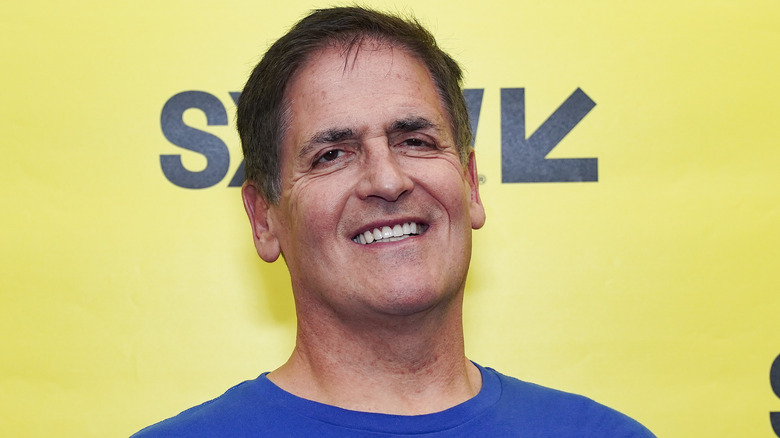The Truth About What Happened To Himalayan Dog Chew After Appearing On Shark Tank
"Shark Tank" has seen dozens of dog treat companies' pitches over the years, but none were quite as popular as the Himalayan Dog Chew, whose owners appeared on the show back in 2015. This organic chew stick for canines caught the attention of judge Mark Cuban, who exclaimed, "Dang! That's a lot of chew."
The Himalayan Dog Chew was conceptualized by founders Suman and Nishes Shrestha (who are not related by blood, just have the same last name) after Suman immigrated from his home country of Nepal to the state of Washington for schooling. The story goes that Suman watched Nishes feed his dog a piece of a traditional Nepalese snack called Churpi, which is a stick of hardened cheese often chewed like gum. Usually by humans, mind you. This gave Suman the idea to use his chemistry background to develop the recipe, and four years later, he had a lactose-free, fat-free pet chew product safe for dogs that was ready to sell in 2007. Along the way, the pair hired Suman's brother, Sujan, to serve as the company's CEO.
Although they were already being sold by specialty pet retailers by the time they appeared on Season 6 of "Shark Tank," the Himalayan Dog Chew team saw the opportunity to expand their business even further. So, what ended up happening to the company after its exposure to millions of viewers across America?
The Sharks believed Himalayan Dog Chew 'didn't need' their cash
In 2015, the trio of founders, Suman, Sujan, and Nishes Shrestha, ventured into the "Shark Tank" looking for the chance to reel in an investor to partner up with. When the Himalayan Dog Chew team announced their initial pitch of $750,000 for 5% equity in their business, valuing their company at $15 million. The impressive sales figures spoke for themselves — over 1 million packages of Himalayan Dog Chews sold, resulting in $5.6 million in revenue, despite the simplicity of the four-ingredient recipe.
The Sharks were thoroughly impressed by the brand but wondered why the company needed $750,000. "I'm about to ask you for a job. I don't know why you're here," fashion retailer Daymond Johnson joked. "This is a great P.R. opportunity," billionaire Mark Cuban chimed in. "You're smart for trying to do it, but you don't need us." To the Sharks' disappointment, the team admitted that they would utilize the money to pay themselves as they haven't taken any profit since the company's inception.
After the tense negotiations, investors Kevin O'Leary, Robert Herjavec, and Laurie Greiner offered the team a "venture debt" loan of $750,000 at 10% interest plus a combined 15% equity in the company. In the end, Suman, Sujan, and Nishes declined the joint offer, leaving with nothing but exposure to the "Shark Tank" audience. Well, it turns out that the Sharks were probably right about "not needing" the investors' money.
The snack that gives back
Telling from the fact that you can buy products from the Himalayan Pet Supply at most major pet retailers — including PetCo, PetSmart, and Chewy — we would say that the company has done more than well for itself since its brief stint on "Shark Tank." The originators of the Himalayan Dog Chew have expanded into chews with added flavors, dental chews, treats, and toys. According to Pet Business, Himalayan acquired a smaller company, Leanlix, in 2015 that sells lickable treat tubes for dogs.
In the November 2022 issue of International Petfood, founder and president Suman Shrestha reported that they had sold a total of over 35 million dog chews in the United States since the company's inception. The treat manufacturer also gives back to the founders' home country by donating one textbook for each pound of cheese sold to schools in Nepal.
"When I started this company, I wanted to make a positive impact on the people of Nepal," Shrestha explained in the publication. "My mother never had the opportunity to go to school because she was asked to take care of her brothers and married at a young age, and my father left school without completing 10th grade to help his parents raise his brothers and sisters. These experiences are far too common, which is why the country has a very low literacy rate. Since many public schools in Nepal do not have libraries, I recognized an opportunity to donate books and build libraries in remote areas of the country."


